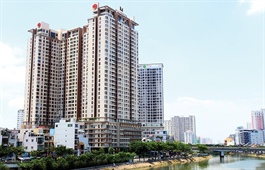Airbnb-style practices targeted with tax proposals
Airbnb-style practices targeted with tax proposals
Proposals currently being pored over to recognise short-term leasing of apartments as a legal business will put pressure on popular homestay groups such as Airbnb.

Airbnb-style practices targeted with tax proposals - illustration photo/ freepik.com
|
The Ho Chi Minh City Real Estate Association (HoREA) is expecting amendments of the laws on Housing and Real Estate Business, according to a document sent to the local government, the Ministry of Construction, and Ho Chi Minh City People’s Committee.
The association also wants to see the issuance of a legal framework and a tax mechanism for businesses like US-based Airbnb.
Over the past five years of operation in Vietnam, the lodging and homestay platform has not once published its revenues in the market, setting a burden for the tax authority to find the base for its tax calculation.
The company’s financial statements show that global earnings last year were $4.7 billion, higher than 2018’s $3.6 billion. Meanwhile, Airbnb skyrocketed in popularity in Vietnam last year with about 30,000 accommodations, increasing as much as five times against 2016.
Airbnb does not own any real estate listings, nor does it host events. As a virtual broker, it receives commissions from each booking. Thus in contrast with brick-and-mortar real estate businesses, Airbnb and other similar platforms have fallen largely outside the scope of the tax framework and state supervision, causing unequal competition in the local property market.
Similar to other cross-border platforms, Airbnb is reportedly neglecting its tax duty in many countries, including Vietnam. At a recent National Assembly meeting, one member said, “In general, if the government could collect full taxes from digital platforms, trillions of VND would be added to the national budget annually.”
Airbnb has yet to comment on its tax responsibilities in Vietnam.
Based on Circular No.103/2014/TT-BTC outlining tax collection on overseas businesses whose incomes partially stems from Vietnam, Airbnb is subject to VAT and corporate income tax (CIT) in the country. Accordingly, Document No.848/BTC-TCT specifying the tax obligation of overseas businesses states that the total tax rate applied on them is 10 per cent – half for VAT and half for CIT.
Moreover, hosts and landlords, which use the platform for business, have to take on the obligation on behalf of Airbnb to pay taxes to the government.
Nguyen Minh Long, director of Dragon Law Company, told VIR that despite the regulation, to date the efficiency of collecting taxes from hosts is low. The main reason behind this is that none of the terms related to Airbnb’s tax duty are mentioned in the two sides’ contract. “Therefore, to avoid the risk that Airbnb would not pay the tax back to them, they tend to use some methods so as to not implement the responsibility.”
Moreover, transactions between landlords and Airbnb are carried out online using international payment accounts without invoices. Those have hampered local authorities in performing tax supervision.
Relevant authorities, the State Bank of Vietnam, and other commercial banks are finishing a draft on standards, conditions, and guidelines for the tax deduction from the bank accounts of anyone who earns income from cross-border platforms. The move aims to officially charge taxes from overseas platforms as soon as possible.
Accordingly, under the new Law on Tax Administration that came into force in July, a cross-border platform can no longer ignore their taxation in Vietnam. Article 42 outlines that overseas cross-border service suppliers will have to directly or authorise the third party to perform the tax obligation despite having no representative offices in the nation.
Once they neglect the tax duty, relevant authorities can automatically charge their tax from the bank accounts of partners transferring money to them. Thereby, the code also stipulates the regulation to allow banks to collect taxes from these accounts.
Le Hoang Chau, chairman of HoREA, said that newer forms of real estate businesses have been popping up in urban areas in recent years, following operating modes and conducting business in a way that was not foreseen by the laws on Housing and Real Estate Business, both from 2014.
The Law on Housing prohibits using apartments for non-residential purposes or for purposes that affect others in the project. The problem is that the two laws clash when it comes to using an apartment or residential property for business. While the Law on Housing allows homeowners’ to lease out their property, the Law on Real Estate Business does not allow registering a business at an apartment (including micro-businesses with fewer than five employees, or those focusing on IT with no direct contact with customers).
In other markets, landlords who let out their property on platforms like Airbnb have to acquire a business registration and fulfil the accompanying tax obligations. Properties are usually listed on these platforms for less than a year, according to US authorities. Meanwhile, Vietnam has no similar regulations.
“It is necessary to adjust the laws towards recognising the platforms as legal businesses. Under local rules, people operating a business have to register and pay taxes in full,” said Chau.






















